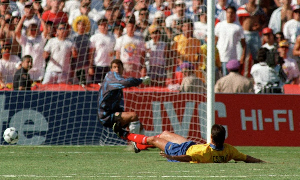In football, own goals happen. They’re accidents, unfortunate, unintended, and part of the game. But for one man, a single deflection cost him more than just a match. It cost him his life.
This is the haunting story of Andrés Escobar, a gentleman of the game, whose tragic death remains one of the darkest chapters in football history.
Colombia’s Golden Generation
In the early 1990s, Colombia’s national football team was riding a wave of promise. They had just thrashed Argentina 5-0 in Buenos Aires, a result that sent shockwaves across the footballing world.
Analysts, fans, and even Pelé tipped them as dark horses to win the 1994 FIFA World Cup in the United States.
At the heart of Colombia’s defence was a calm, composed 27-year-old centre-back: Andrés Escobar.
Nicknamed “El Caballero del Fútbol”, the Gentleman of Football, Escobar played with elegance, humility, and discipline. He wasn’t just a footballer. He was a symbol of decency in a country fighting to reclaim its soul.
June 22, 1994 – The Fateful Night in Los Angeles
Colombia faced the United States in a group-stage match at the Rose Bowl in Pasadena. They had already lost their opening game and needed a win to stay alive in the tournament.
Then, in the 34th minute, disaster struck.
As US midfielder John Harkes sent a low cross into the box, Escobar slid in to block it. Instead of clearing it, the ball deflected off his right leg and trickled past his own goalkeeper. An own goal. A freak moment. A cruel twist.
Colombia lost 2-1. The dream was over. They were out.
What should have been remembered as a mere mistake on the pitch would soon turn into a national tragedy.
July 2, 1994 – The Night the Game Stopped
Just 10 days after the match, Escobar returned to Medellín. He was urged by friends and family to stay away from public places, but in his nature, he wanted to face his country, not hide from it.
That night, he went out with friends to a bar. As the evening wore on, his friends left. Escobar remained.
In the parking lot of the El Indio nightclub, he was approached by a group of men. Witnesses say they taunted him, mocking the own goal by shouting “Goal!” repeatedly, echoing the TV commentary from that fateful night.
Then, in a moment that shocked the world, Escobar was shot six times.
With each shot, his killer reportedly said “Goal!” again and again.
Escobar died just hours later at the hospital. He was 27.
Why?
The motives remain tangled in Colombia’s dark past. The 1990s were a time when football, drugs, gambling, and violence were cruelly intertwined.
Reports suggested that powerful drug cartels had placed large bets on Colombia progressing in the World Cup.
Escobar’s own goal and Colombia’s early exit cost them millions. And in that corrupt, volatile era, one man’s error became a blood debt.
The man who pulled the trigger, Humberto Muñoz Castro, was a bodyguard for a cartel-connected crime family. He was sentenced to 43 years but served only 11 before being released in 2005.
The Aftermath – A Nation in Mourning
The news sent shockwaves through the football world. Over 120,000 people attended Andrés Escobar’s funeral in Medellín. Millions wept. Millions asked how a game, just a game, could lead to this.
Players and fans across the globe paid tribute. FIFA held a moment of silence. Colombia was forced to face the consequences of allowing crime and sport to coexist in the shadows.
Legacy of a Gentleman
Today, Andrés Escobar is remembered not for his own goal, but for his grace. His commitment. His dignity.
To this day, murals of his face stand tall in Medellín. His story is taught in schools. And every year on July 2, fans remember him.
FKA/EB
Meanwhile, watch as Prophet Worlasi shares bombshell prophesies on Bawumia and NPP on The Lowdown:



